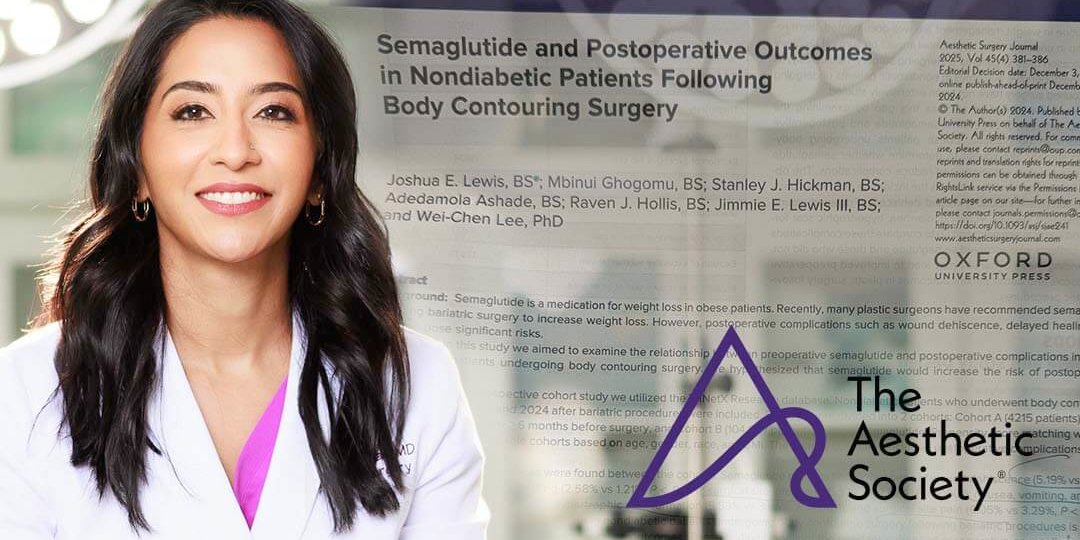Navigating Semaglutide and Body Contouring: What This New Study Means for Your Safety and Results
Hi everyone, I’m Dr. Shruti Tannan, a board-certified female plastic surgeon located in North Carolina. As a woman and a surgeon, I’m deeply committed to ensuring you have the safest and most rewarding experience when considering plastic surgery after weight loss. That’s why I’m always keeping a close eye on the latest research. A recent study published in the Aesthetic Surgery Journal (Lewis et al., April 2025) has some very important insights to share regarding semaglutide and body contouring safety. If you’re familiar with medications like semaglutide (think Ozempic, Wegovy, Monjauro, Zepbound) or similar GLP-1 receptor agonists and are considering a cosmetic procedure, this is an important read.
Now, we all know the many benefits of GLP-1s, from helping people lose weight to improving elevated cholesterol, high blood pressure, and even helping with addiction. Right now, one in eight adults has taken or is currently taking a GLP-1. If you’re not on it, chances are pretty high that someone in your family is. When we lose weight quickly, we also wind up with extra sagging skin in the belly, breasts, and possibly and arms and thighs. It is a very natural progression to want to do something about the extra skin after weight loss. Body contouring procedures are common in people taking semaglutide or other GLP-1s, as they move forward on their weight loss journey.
This blog post is my way of sharing important information about optimizing your surgical outcome for plastic surgery body contouring procedures after semaglutide. There are some serious risks with GLP-1s that need to be understood so you can take charge of your recovery, and ensure the best possible healing. You can overcome these issues with a little knowledge and preparation, so let’s get straight to it.
The Study's Key Findings: Increased Risks with Semaglutide
This study took a look at the medical records of over 4,000 patients on semaglutide who had body contouring surgery (this is plastic surgery to the body after weight loss, like tummy tuck, breast lift, arm lift, thigh lift, etc). They compared the patients taking semaglutide to patients who had the same procedures and were not taking any weight loss medications. Now, while every study (including this one) has its limitations, the findings were pretty clear: the individuals taking semaglutide experienced a higher rate of certain complications after their procedures. These included things like:
- Surgical incisions opening back up (wound dehiscence)
- Slower healing (wound healing delay)
- Increased Infections at the surgical site
- Increased nausea
- Thicker and more noticeable (hypertrophic) scars.
Now, I know what you might be thinking: “Why would a weight loss medication affect my surgery outcome?” It’s a great question, and understanding the “why” is key.
Understanding the "Why: "Semaglutide's Impact on the Body
Semaglutide and other GLP-1 receptor agonists work primarily by mimicking a natural hormone that helps regulate blood sugar and appetite. This leads to:
- Satiety: Increased feelings of fullness, prompting reduced food intake.
- Delayed Gastric Emptying: Food moves more slowly from the stomach to the intestines.
While these mechanisms are beneficial for weight loss, they can pose challenges in the context of surgery. The delayed gastric emptying increases the risk of aspiration during anesthesia. What do I mean by that? When you lay flat on your back with a full stomach and you are induced with general anesthesia, your food could enter your lungs and cause a pneumonia. Furthermore, the appetite suppression can inadvertently lead to malnutrition, especially if patients aren’t diligently focusing on nutrient-dense foods, particularly protein. Malnutrition around the time of surgery affects your healing.
The Critical Link: Malnutrition and Impaired Healing
And here’s where the critical link lies: proper nutrition, particularly enough protein, is absolutely essential for healing after any major surgery. Think of it as providing your body with the building blocks it needs to repair and recover. If you’re already potentially not getting enough of these vital nutrients after semaglutide decreases your appetite, your body might struggle to heal as effectively, which could explain the higher complication rates seen in the study. Plus, restarting semaglutide too soon after surgery could perpetuate this cycle making it difficult for your body to properly heal.
Key Takeaways and Actionable Advice for Patients
So, what does this mean for you if you’re considering a procedure like a tummy tuck, liposuction, or a breast lift and you’re currently taking semaglutide or a similar medication? Even if you’re on a lower dose or following a significant calorie-restricted diet like intermittent fasting, here’s what we need to discuss:
- Let’s Have an Open Chat: It’s absolutely crucial that you’re completely upfront with me and my team about any GLP-1 medications you’re taking, including the dosage and how often. No detail is too small – your safety is our top priority.
- Nutrition is Your Superpower: We’ll work together to create a personalized nutrition plan leading up to, during, and after your surgery. This will focus on making sure you’re getting enough protein and calories to support optimal healing.
- Timing is Everything with Medications: Based on the latest research and our best practices, we’ll give you clear guidelines on when you’ll need to temporarily pause your semaglutide or similar medication before your surgery to minimize risks and promote better healing. Following these instructions is so important for your well-being.
- Continued Nutritional Support: We’ll keep emphasizing the importance of good nutrition throughout your recovery to help your body heal beautifully and minimize any potential complications.
- We’re a Team: Your active involvement in this process is key. By being open about your medications and diligently following our nutritional and medication guidelines, you’re directly contributing to a smoother recovery and the best possible results.
My goal is always to provide you with the safest and most successful surgical experience. This recent study highlights the importance of a thoughtful and informed approach, especially for those using weight loss medications. By working together with our all-female team, prioritizing open communication, and focusing on your nutritional needs, we can navigate these considerations and help you achieve your aesthetic goals safely and effectively. I’m here to answer any questions you have, so please don’t hesitate to reach out.
Interested in learning how to optimize your plastic surgery outcome while on semaglutide or other GLP-1s? Call to schedule a consultation with our board certified female plastic surgeon at (919) 797-0996.











